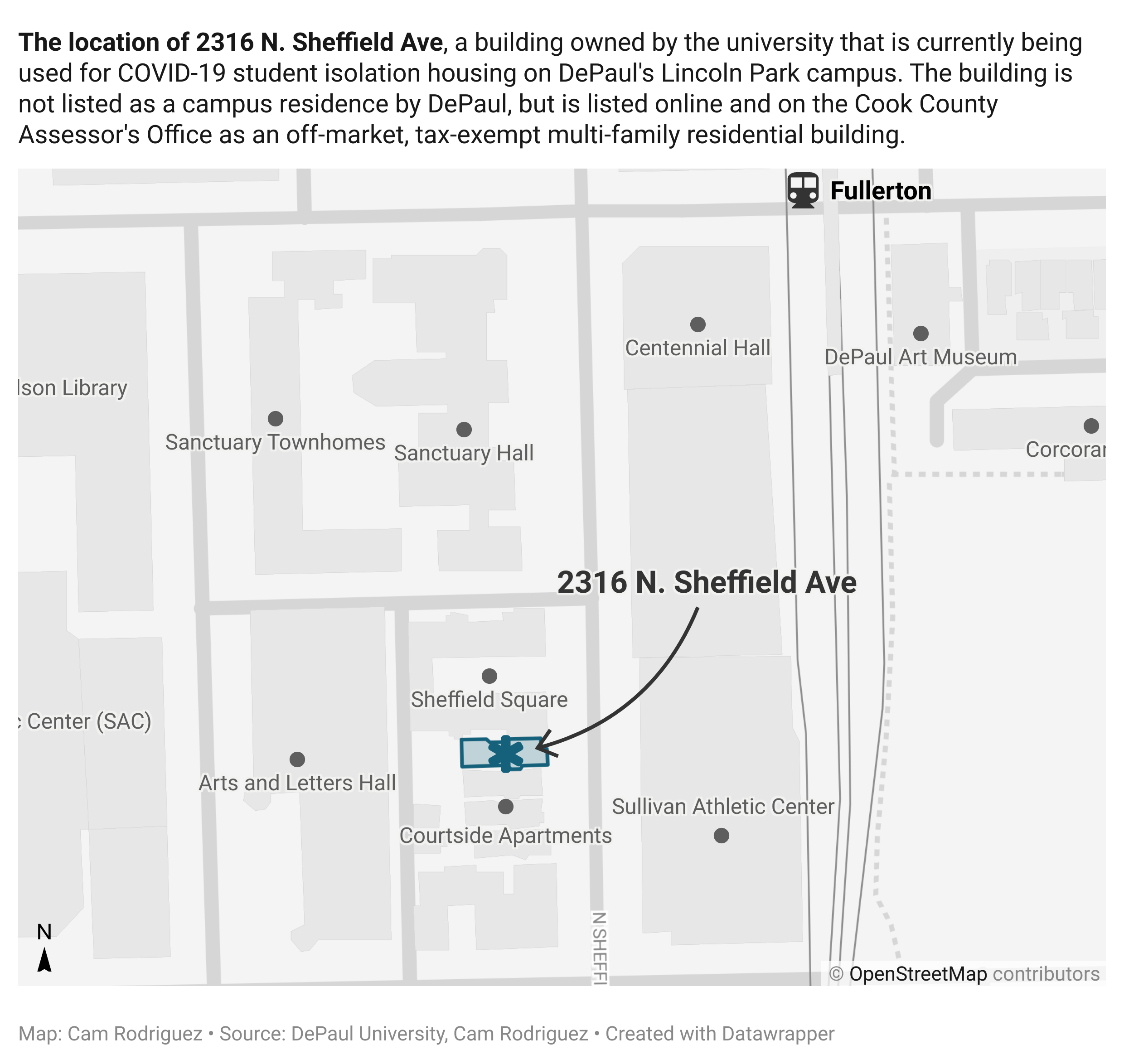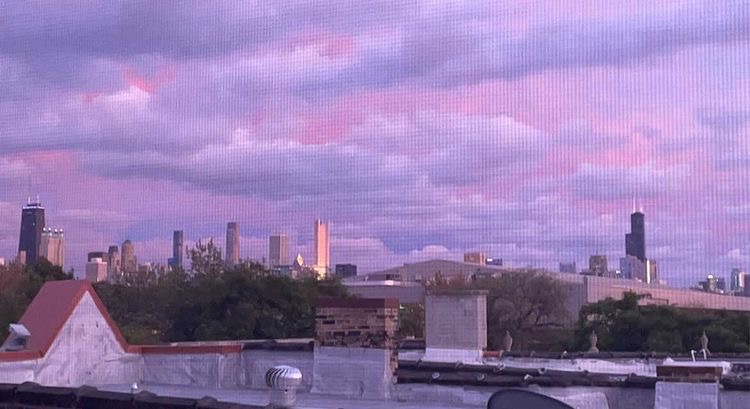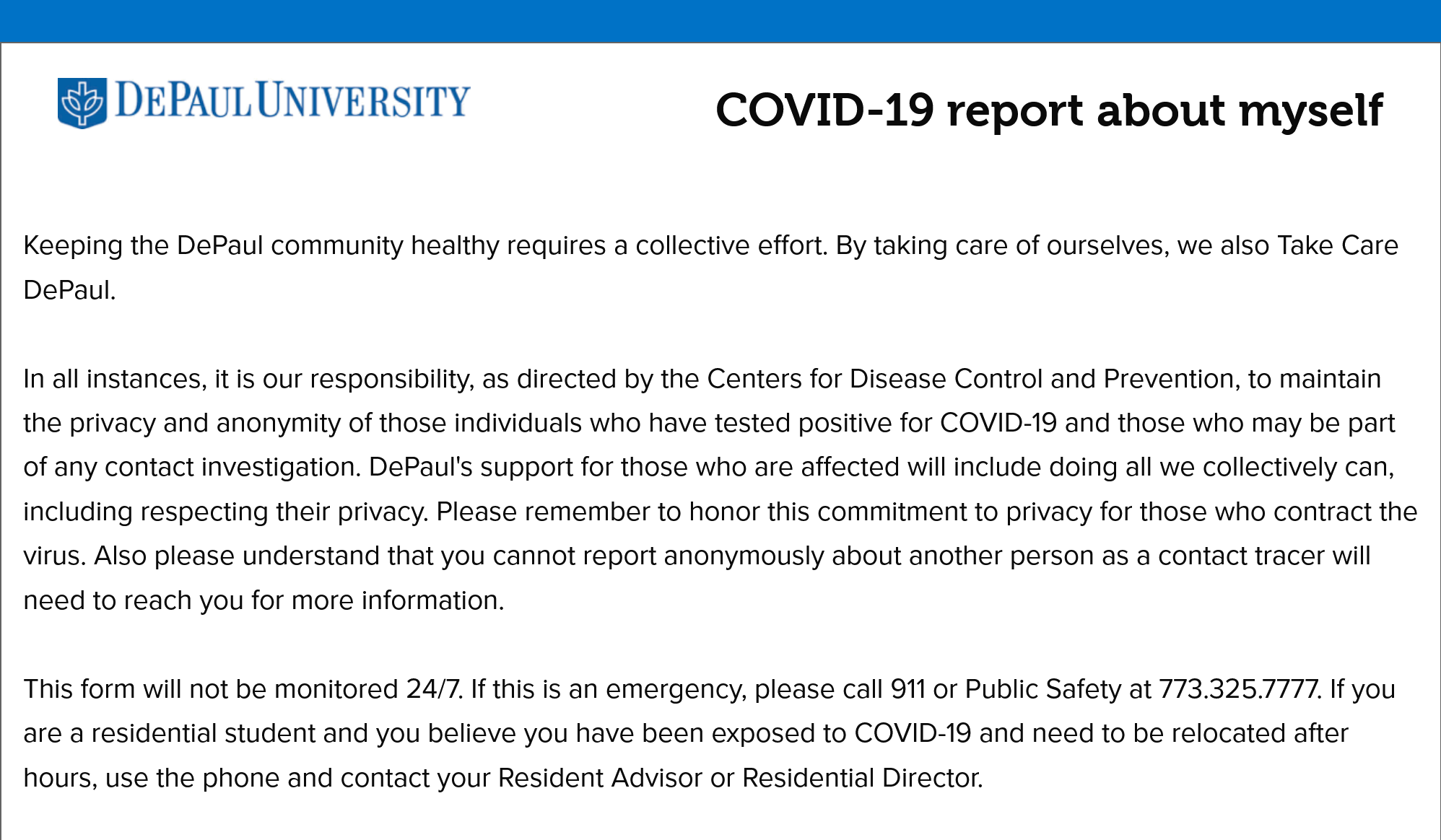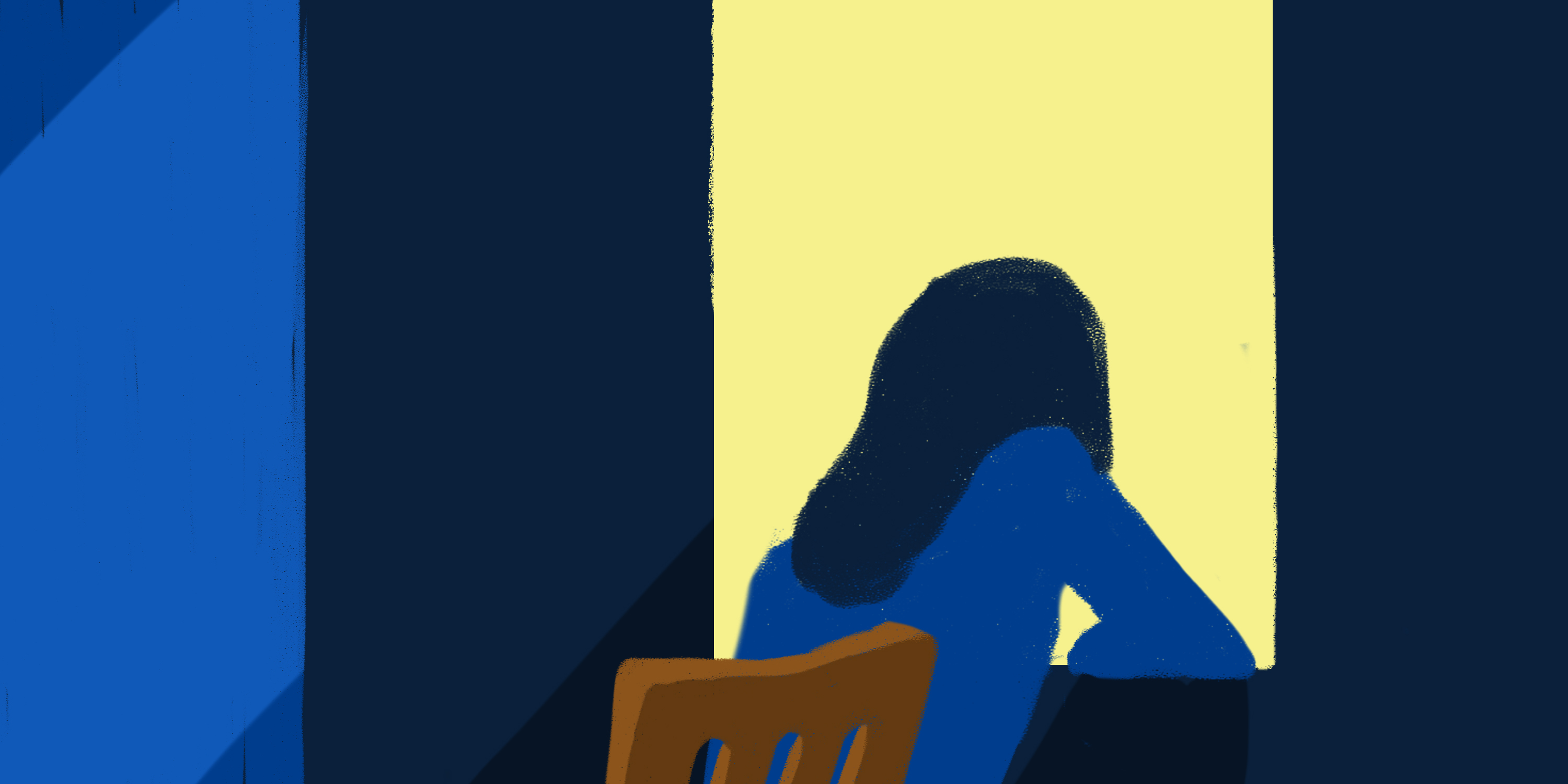Editor’s Note: Two sources in this story have been attributed by their first name only to ensure privacy and safety as they return to campus.
For some DePaul freshmen, last week marked their second return to campus — a relief for those recovering from COVID-19 after isolating in DePaul’s dedicated quarantine housing.
This fall, DePaul’s departments of Housing, Dining & Student Centers as well as Residential Education allowed students to live on-campus at full-capacity for the first time since March 2020.
To prepare, the two departments released the 2021-2022 Isolation Guide, which details university protocols on safely moving residents who test positive for COVID-19 to designated DePaul facilities in Lincoln Park.
Yet, little data is available about the total number and exact locations of isolated students at DePaul, though 72 COVID-19 cases have been confirmed since the beginning of fall quarter, 70 of which have been students. 14 East contacted the Department of Housing, Dining & Student Centers several times regarding the total number of students in isolation on campus, but the department refused to provide a number.
With DePaul Housing beginning to allow parent and guardian — but not student — guests to non-isolated residence halls this week, Director of Housing, Dining & Student Centers Rick Moreci said the departments will “re-evaluate the guest policy every two weeks moving forward.”
“I was a little bit worried about [the university reopening],” one isolated student said. “But I also was like, ‘Oh, it’s fine. I’m vaccinated, and everyone here is vaccinated. They’ll be okay,’” they said. “But then I ended up getting COVID.”
Student Quarantine
For freshman student Emma — who asked to be attributed only by her first name — isolation was initially an intimidating process.
“The very first day was my worst day, I was so anxious,” she said. “When you get the email, they’re like, ‘You can’t go outside. You can’t talk to anyone.’ And you’re just like, ‘Oh, my god,’ but then it kind of sets in. Outside of that, it does get a little lonely. Some days you wake up, anxious that you’re so cut off from the world, but … it’ll be over soon. I’m just pushing through with that.”

During the first full week of classes, Emma tested positive for COVID-19 after experiencing cold and flu-like symptoms. On September 15, Emma said she contacted DePaul Housing Services and filled out the self-reporting form on their website. Shortly after, she was quarantined to on-campus housing at apartments located across the street from Whole Foods at 2316 N. Sheffield Ave.
Maya — another freshman who asked to be referenced by first name only — was also moved to 2316 N. Sheffield Ave on September 15 after testing positive for COVID-19. Both students initially tested negative after taking a rapid test, but polymerase chain reaction (PCR) tests confirmed they had COVID-19.
“A lot of my friends ended up having [COVID-19] so I’m sure we just passed it along,” Emma said. Maya also mentioned several of their friends contracted COVID-19 during this time.
“I had such a bad migraine … looking out my window without sunglasses was like excruciating pain and I was super nauseous,” Maya said. “My throat hurt … I was getting, like, muscle aches and pains … It was so painful.”

The view from Maya’s dorm while they were isolated for COVID-19. Photo courtesy of Maya.
Maya, who is non-binary, was asked by staff if they would be comfortable staying in a female-identifying dorm. “I thought it was kind of funny, just because … they were so careful about the words that they were using,” Maya said. “But they were really considerate about it.”
During their stay, Maya also fainted and was taken to the hospital after Public Safety officers called them an ambulance.
Moving-In
According to DePaul’s official guidelines, COVID-19 cases must be reported — either by the person that tested positive or by someone that knows they have tested positive — via one of two online forms. Students on campus are instructed to call Public Safety. This information is then used to conduct university contact-tracing to notify others if they’ve been exposed.

The online form where students or faculty can report their own COVID-19 case.
Both Emma and Maya self-reported in addition to calling Public Safety, transferring them from their dorms to the apartments within a few hours. They were able to take two trips to gather necessities before access was revoked to their original residence halls.
According to both students, around 15 students were quarantined at the apartments during their stay, out of 18 total units available between four floors. When asked about where other students were quarantining, housing representatives refused to specify exact locations, citing HIPAA concerns.
While university guidelines don’t state the ideal timeline for contact tracing, Emma said she was in quarantine for six days before anyone called to interview her about her close contacts, nearly a week after she tested positive.
“I feel like for what they have and what they can do safely, [the university] did a pretty nice job,” she said. “But my contact tracer was late in reaching out to me, which I understand — there was probably a million of us coming in at once.”
“For what they have and can do safely, the university did a pretty nice job. But my contact tracer was late in reaching out to me, which I understand — there was probably a million of us coming in at once.”
According to a statement from Associate Director of Emergency Management Cheryl Hover, “DePaul follows all CDC guidelines for contact tracing, isolation and quarantine protocols.” Hover was unavailable for a comprehensive interview at the time of publication after multiple attempts by 14 East to get in contact.
Despite this, the Center for Disease Control and Prevention (CDC) recommends “a close contact to a patient with confirmed COVID-19 should be notified of their exposure as soon as possible, or within 24 hours of contact elicitation.”
According to DePaul’s 2021 guide, students in isolated housing are unable to leave their rooms for any reason except to receive medical care or contactless meal delivery set outside their dorms twice each day. To ensure student safety, Residence Directors on duty check in with students twice a day over email or phone.
In addition to providing contact tracing, the university also supplies isolated students with essential items like toilet paper, cleaning supplies, food and water which can be requested online via a work order.
However, Maya and Emma said they lacked hand soap, dish soap and toilet paper for several hours upon arriving.
“My floor has also just run out of water,” Emma said on Tuesday, September 21, her sixth day of quarantine. According to her, the floor ran out of bottled water on her fourth day of isolation. “And since we can’t go out, we’re a little bit stuck on what to do whenever any of that happens.”
Emma said she and other quarantined students didn’t think to put in a request with campus housing and instead used a grocery delivery service. According to the 2021-2022 Quarantine and Isolation Guide, off-campus food delivery services are allowed but only between certain timeframes.

Listed above are the timeframes isolated students are allowed to order off-campus delivery services (2021-2022 Isolation Guide)
“I was surprised they let us do that, but really happy about it,” Emma said.
“Food ordered from any off-campus service will be the responsibility of the student and will not be reimbursed in any way,” the guide states. Students also have to use services that require prepayment for food, like Postmates, DoorDash or Instacart.
That said, students are provided with two meals a day, and an optional continental breakfast, delivered to their rooms. Students can put in their orders via DePaul’s dining text chat service.
The isolation guide also notes that students in isolation must not leave their unit, unless they have a medical appointment, medical emergency or building emergency, and that quarantined residents who leave their room for non-medical or non-emergency reasons “will face disciplinary action,” including a possible removal from housing altogether. For non-emergency medical services, students can receive care from AMITA Sage Medical Group.
Maya said building emergencies can include concerns such as the two students they said were transferred from the apartments due to a maintenance issue.
In Recovery
While isolated, students are expected to coordinate with professors to receive course material they may have missed in-person.
In an email to faculty in August, the university provided guidelines for departments to establish “compassionate and flexible” attendance policies for students who are exposed or test positive for COVID-19, including staying home if unwell and expecting student absences. However, there is no enforcement for professors to accommodate students besides offering a clear attendance policy listed in class syllabi.
Maya claims that while they were in isolation, one of their professors wasn’t following attendance policy guidelines recommended by the university.
“One of my professors specifically said, ‘if you’re sick, don’t tell me. I don’t want to know. You’re an adult; you can manage it on your own,’” they said.
Maya said because their professor doesn’t allow extensions, they received a 10 percent grade reduction for a late paper while in isolation. Maya denied sharing the professor’s name out of concern they would face repercussions from the university.
Both students mentioned, however, their other professors have been accommodating and compassionate about their respective situations.
Still, university miscommunication persisted in Maya’s case, who said they were told conflicting dates about the end of their isolation period from both residence directors and DePaul’s contact tracing team.
“One of my professors specifically said, ‘if you’re sick, don’t tell me. I don’t want to know. You’re an adult; you can manage it on your own.’”
A Return to Relief
Last Thursday Emma and Maya were officially cleared to return to campus, following eight days in isolation and 10 days since the time their symptoms began.
Both are just excited to enjoy homemade food and a warm cup of coffee again.
“I am so excited to see my friends again, and also get coffee or just like any drink other than water and Gatorade,” Maya said. “I just want food that has just been made … I don’t care where it’s made from. I don’t care who made it. I don’t care if they’re spitting my drink. I just want something.”
Additionally, Maya and Emma left quarantine with lessons in COVID-19 safety and the possibility of re-isolation.
“I hope that [other students] are able to stay safe,” Emma said, adding that her experience will push her to tighten restrictions when back on campus.
“I’m hoping that people stop testing positive … getting sick and then isolating [to] not spread it further,” Maya said. “Because I really don’t want classes to go fully online.”
For fellow classmates, they also offer this advice from isolation:
“Please just go do it. Even if you get a positive test, and you really don’t want to, just go be responsible and isolate,” Emma said. “It’s not awful and it goes by kind of fast.”
In addition to 14 East’s weekly COVID-19 newsletter, several other resources exist for COVID-19 information on campus and across the city of Chicago. For questions about specific COVID policies at DePaul, the collection of FAQs across different departments and university communities is probably best, or visit go.depaul.edu/covid.
Header image by Teagan Baker. Graphics by Cam Rodriguez.




NO COMMENT